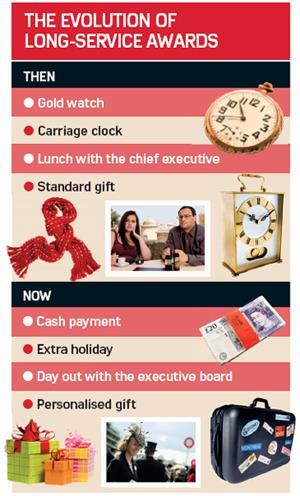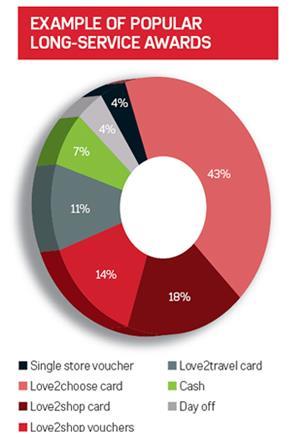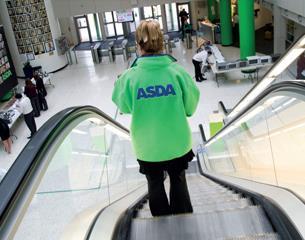IF YOU READ NOTHING ELSE, READ THIS…
- The cost to employers of providing long-service awards will increase as employees work longer.
- Recognition for one or two years’ service is increasing as the UK workforce becomes more transient.
- The value of long-service awards increases with employees’ length of service.

Gold watches, carriage clocks and lunch with the chief executive have for many years been the traditional long-service awards granted to employees in recognition of their loyalty to their employer.
But as the workplace evolves, what is the future for long-service recognition?
Firstly, the definition of long service itself is changing, partly because of the removal of the default retirement age (DRA) in October 2011, which enables employees to work beyond the state pension age (SPA).
As staff stay in work for longer, this could increase employers’ use of long-service awards to recognise employees’ loyalty. However, this is based on the assumption that service correlates in some way with age.
Factors other than age may also affect the nature and cost of employers’ long-service award strategies. For example, the increasingly mobile and transient nature of the UK workforce is prompting employers to recognise and reward employees after as little as one or two years’ service.
Steve Baker, head of recognition and incentives at Grass Roots, says that, irrespective of length of service, employers must keep the objectives of their award strategy uppermost in their mind. “If the reason for offering the long-service award is to help with retention, then a sensible thing to do is to identify the point at which the organisation becomes at risk of people leaving, and introduce things at that stage to reflect loyalty and encourage people to stay,” he says.

Conversely, in some sectors, employers place less importance on long-service awards and instead run an employee of the week or month scheme.
But more awards means higher costs. For example, Asda estimates it will invest about £10 million a year in its long-service package over the next five years. The supermarket chain’s annual long-service event recognised more than 1,200 employees in 2012, a figure the organisation expects to grow to 1,600 in 2013 and 2,000 in 2014.
Alan Beazley, policy and advice specialist at the Employers Network for Equality and Inclusion (ENEI), says: “Cost is likely to go up somewhat as the workforce ages, but in the whole scheme of things, [awards] tend to be relatively low value anyway, since they are token awards rather than financially attractive. Compared to the other costs that go up as a result of workforce ageing, such as the cost of providing private health insurance or group income protection, it is a drop in the ocean.”
Benjamin Reid, senior researcher at The Work Foundation, agrees. “Given that their primary purpose should be individual recognition, it seems a bit stingy to pull back on long-service awards [as a result of the DRA removal],” he says.
Award choice will inevitably affect costs, particularly when it comes to older workers. Colin Hodgson, sales director for incentives and motivation at Edenred, says: “Individuals are retiring at a later age, which means the value of their recognition is potentially higher, because they are now achieving 25 years, as opposed to 15 years [service]. It could be that, at 25 years, an award includes the option of share certificates alongside a more traditional form of reward, such as multi-retailer gift cards.”
But diversity should be at the heart of any strategy, whatever an employee’s age, and rewards could involve online merchandise catalogues, vouchers and credit card-style gift cards. Hodgson says employers are trying to be more flexible in what they provide and more dynamic in how they deliver it.
For example, employers are increasingly using personalisation to ensure that awards, which are meant to reward loyalty, show that they know their employees. John Dove, business incentives manager at House of Fraser, says: “There is a need not to make it too utilitarian, so this is a treat rather than something that is going to get absorbed in next week’s housekeeping.”
Grass Roots’ Baker adds: “Long-service awards are the employer saying thank you for loyalty and, at that point, if it chooses a gift on the employee’s behalf that is not appropriate, it spoils the moment.”
A physical component to an award should be considered for online schemes, such as a presentation from an employee’s line manager in front of their peers or at a formal awards ceremony. The Work Foundation’s Reid says: “Using it as a process of public recognition is still the core of what long-service benefits are. As long as that is kept at the core of the purpose, then it still has quite a lot of value.”
Baker adds: “The platform through which employers can offer awards changes technologically all the time, but the principle behind it, to say thank you publicly and give employees a free choice, is the constant.”
CASE STUDY: Asda

Badges of honour
Asda’s 177,000 UK employees wear badges that display their length of service. At each service milestone, be it one year or 10 years, staff receive a new badge displaying their length of service and a certificate.
Employees receive a one-off cash payment of £15 or £20 at 15 and 20 years’ service, respectively, on which Asda pays the tax and national insurance.
Alan Robertson, recognition team leader at Asda, says: “We are reviewing that because £15 and £20 payments are not particularly relevant in today’s economy. It is still seen as a celebratory gesture.”
The value of long-service awards increases significantly after 25 years’ service, when staff receive £300 in cash; an extra week’s holiday to be taken in that year; an invitation to the Big Asda Anniversary, an annual event arranged for long-serving staff; and a special gift.
These three awards are repeated at every five-year milestone from 25 years, plus a bouquet of flowers.
The 2012 Big Asda Anniversary was held at Doncaster Racecourse in July. Almost 1,300 staff were invited to a three-course meal, with Asda’s executive board and senior directors hosting tables.
The number of Asda employees celebrating long-service milestones has increased dramatically. Robertson says:
“We will invest around £10 million a year in our long-service package over the next five years. We invited 1,300 people to the Big Asda Anniversary this year. We expect that to be up to 1,600 next year and then to peak at 2,000 the year after.”
Asda’s longest-serving employee works in Northern Ireland and has been with the company for 51 years.











